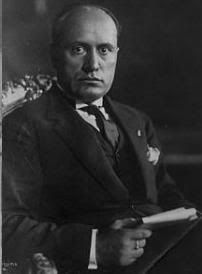Benito Mussolini
From Kaiserreich
|
Benito Amilcare Andrea Mussolini (born on July, 29 1883 in Dovia di Predappio, now part of the Italian Federation) is an Italian syndicalist politician. He is the current General Responsible for Transports of the Italian Republic and chairman of the Marxist-Leninist National-Syndicalist Union.
Biography
Mussolini was born in Dovia di Predappio, a small town in the province of Forlì in Emilia-Romagna, to Alessandro Mussolini, blacksmith and socialist activist, and Rosa Maltoni, school teacher, who was however a devout Catholic. He was named Benito in honour of Mexican President Benito Juarez. As a young boy, Mussolini would spend time helping his father in his blacksmithing. He was expelled from a boarding school ran by monks due to violent behaviour. After joining a new school, Mussolini achieved good grades, and qualified as an elementary schoolmaster in 1901.
In 1902, Mussolini emigrated to Switzerland to find work and to expand his political horizons. During a period when he was unable to find a permanent job there, he was arrested for vagrancy and jailed for one night. Later, after becoming involved in the socialist movement, he was deported to Italy and volunteered for military service. Mussolini found a job in February 1908 in the city of Trento. He did office work for the local socialist party and edited its newspaper L'Avvenire del Lavoratore. It did not take him long to make contact with irredentist politician and journalist Cesare Battisti, and to agree to write for and edit his newspaper Il Popolo ("The People") in addition to the work he did for the party.
In 1915, he had a son with Ida Dalser, a woman born in Sopramonte, a village near Trento. By the time Mussolini's novel was printed in Il Popolo, Mussolini was already back in Italy. His growing defiance of Royal authority and anti-clericalism got him in trouble with the authorities until he was finally deported at the end of September. He was prompted to return to Italy once again when his mother became ill. He became a journalist for the socialist newspaper, Avanti!. After initially writing on numerous occasions against the war in the socialist paper Avanti, Mussolini relented and he and his class were called up in August of 1915 for active duty.
Although his military record was unremarkable, it was without blemish and it has been suggested that he may have been prevented from moving further along in the ranks due to his ongoing political agitation in various periodicals. Overall he totaled about nine months of active, front-line trench warfare. During this time he contracted paratyphoid fever. His military exploits ended in 1917 when he was wounded accidentally by the explosion of a mortar bomb in his trench. He was left with at least 40 shards of metal in his body. He was discharged from the hospital in August 1917 and resumed his editor-in-chief position at his new paper, Il Popolo d'Italia.
As a socialist newspaperman, Mussolini participated to the early stages of the Italian Revolution, calling for revolt and resistance against the Central Powers in his newspaper, and going for sabotage operations in Austrian-occupied North Italy. When the occupation authorities finally decided reprisals and that the Syndicalist revolution broke out in Sicily and Naples, Mussolini quickly escaped to the South and was appointed colonel in the quite unexperienced Italian Republican Army, having a few success in Campania but being defeated, along with his fellows, at the Battle of Anzio.
Il Popolo d'Italia, which he still ran, became one of the few newspapers still authorized in the Socialist Republic of Italy, and thus became one of the official organs of the government, even if Mussolini rather agreed with the Soviet Russian thesis than the Travailleur French ones. Forced to step down for his position of editor-in-chief after a smear campaign against politician Giacomo Matteotti, but gained the post of General Responsible of Transports, where he proved to be quite qualified, as the slogan says: "Mussolini made the trains run on time".
He has also founded a Bolshevik-type tendency within the Italian trade unions, the National-Syndicalist Union, which has restricted but noticeable audience. The National-Syndicalist Union argues for a more centralized state with a better control over the economy and the internal affairs of the country. Lately Mussolini discussed with Oswald Mosley about a new doctrine developed by the leader of the British Maximist that will probably be announced to the world in 1936.

